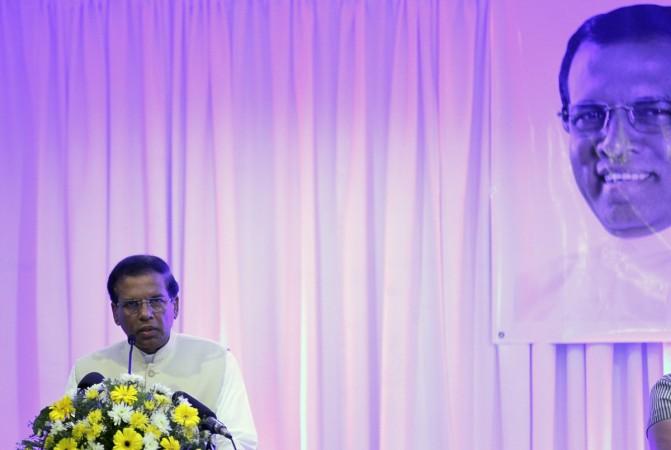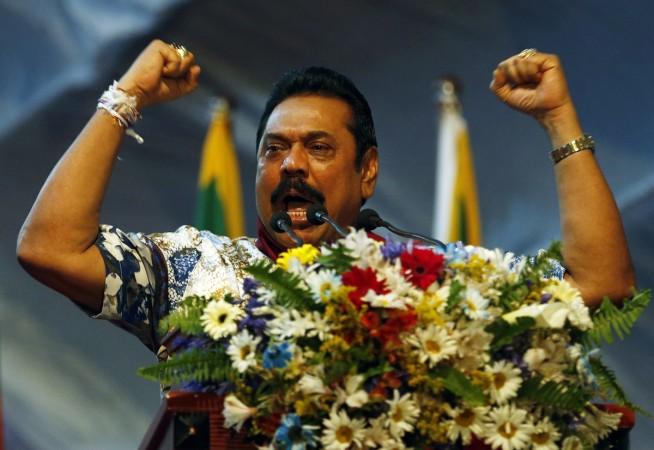The January elections being fought between Sri Lankan presidential hopefuls, incumbent Mahinda Rajapaksa and opposition candidate Maithripala Sirisena, would also determine India's relevance in regional diplomacy.
Rajapaksa, two-time president since 2005 who crushed the Liberation of Tamil Tiger Eelam (LTTE), called for elections two years ahead of schedule, to be held on 8 January, hoping to turn the military victory into a license for lifetime rule.
The Opposition

However, Rajapaksa not only expected to remain unopposed, but never expected the opponent to be Maithripala Sirisena, health minister in his cabinet.
Sirisena was able to rally an invigorated opposition. The Bandaranaike family's Chandrika Kumaratunga extended support, with former Prime Minister Ranil Wikramasinge also lending support.
For a first, the coalition consists of an ultranationalist Buddhist party, the largest Muslim political party -- Sri Lanka Muslim Congress and the main ethnic Tamil political party -- Tamil National Alliance (TNA).
Jaffna's Tragedy
LTTE was possibly the world's only militant group based on linguistic affiliation, unencumbered by religion or ideology. The Rajapaksa government dealt a military defeat in May 2009.
Since the defeat, Rajapaksa has ensured continued militarisation, colonisation and a deliberate demographic change, seen as a measure to ensure the Tamils never regroup again to become strong enough to fight for their rights.
However, at an election rally in Jaffna, former LTTE powerbase, Rajapaksa exhorted the Tamils to vote for him, claiming, that a 'known devil,' was better than an unknown angle.
India's Bluff
India, ruled by then Congress-led UPA wanted the LTTE crushed as retribution for assassinating its governing family's Rajiv Gandhi. India watched Pakistan and China supplied weaponry rain on LTTE cadres and Tamil civilians, causing significant causalities which have never been investigated.
Even as the Congress managed to lead with 'coalition dharma,' thousands died or were declared missing in what was one of twenty first century's bloodiest battles.
Chinese Ports
India again stood and watched Chinese develop ports and other infrastructure in Sri Lanka, leading to increased Chinese submarine activity in India's backyard and 'call on ports' in Sri Lanka for 'replenishment visits'.
The traditional stranglehold had loosened and India has not found itself on the winning side either politically, commercially, militarily or diplomatically.
Rajapaksa was allowed to ignore India's legitimate concerns.

Elections 2015
The Sri Lankan military has often been accused of intimidating opposition voters and campaigning for a Rajapaksa victory in the past elections.
This election would be a litmus test to determine Sri Lanka's democratic affiliations. The police said Elite Commando units would be deployed to ensure balloting went without interference.
India and many other countries have sent election monitors to oversee the January elections.
The Tamil Question
If Sirisena wins the elections, the constitution would be amended within the first 100 days in a bid to weaken the executive presidency and bring in a government headed by a prime minister.
However, if Rajapaksa wins, not much is expected to change.
Irrespective of who wins, Jaffna would continue to see militarisation remain. The Thirteenth Amendment, promising devolution of powers to the provinces, is unlikely to be implemented.
Way ahead
It is in India's interest to see the Sri Lankan Tamil issue moves towards a peaceful resolution. While it has not been possible with the Rajapaksa government, India must be able to bear down on Sirisena, who is also being backed by the Tamils.
The Narendra Modi government does not rely on its coalition partners from Tamil Nadu to survive. It is on strong footing to ensure that Sri Lankan Tamil rights are not hijacked by TN-based political parties for political reasons, and can play the role of a responsible and mature nation, interested to bring peace to a war-torn nation and to help rebuild.
Reason demands a change in political and economic climate for all constituents of the Sri Lankan demography. Peace has to be purchased at a high price; it is time the Sri Lankans decide to make use of it for favourable results.
While Sirisena promises to treat India and China equally, it is necessary for India to ensure that it earns the respect of citizens of both nations as peacemaker.
Neither India nor Sri Lanka can afford to lose this golden chance that would see its military victors - the Rajapaksa brothers, being vanquished.
'History repeats itself, first as a tragedy and second as a farce,' said Karl Marx. Sri Lanka's history is scared with tragedies of biblical proportions; the elections of 2015 must be a pointer to progress for all citizens.














